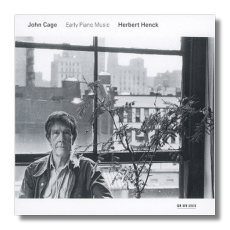
The Internet's Premier Classical Music Source
Related Links
- Cage Reviews
- Latest Reviews
- More Reviews
-
By Composer
-
Collections
DVD & Blu-ray
Books
Concert Reviews
Articles/Interviews
Software
Audio
Search Amazon
Recommended Links
Site News
 CD Review
CD Review
John Cage

Early Piano Music
- The Seasons
- Metamorphosis
- In a Landscape
- Ophelia
- Two Pieces for Piano (1935, rev. 1974)
- Quest – Two Pieces for Piano (1946)
Herbert Henck, piano
ECM New Series 1844 476151-5 DDD 69:22
Having issued Herbert Henck's compelling reading of John Cage's Sonatas and Interludes for Prepared Piano two years ago, ECM New Series has now issued a new collection of Cage's "Early Piano Music," again masterfully played by Henck. The earliest of these pieces is Quest, written in 1935 when the composer still was under the presumptive influence of Arnold Schoenberg. The most recent, In a Landscape, dates from 1948, when the composer's experimentation with prepared piano was picking up steam. (There are no works for prepared piano on this CD, however.)
Later in his career, as his music became ever more influenced by chance, Cage would not strew notes across the paper as generously as he did in the 1930s and 40s, although one certainly could argue that his music became far deeper and more spiritual. No matter how much his style changed, however, Cage always was adept at saying more with less, and with challenging the listener to adjust, to keep up with change, and to hear things with fresh ears. Compared to, say Prokofieff (to name just one contemporary), Cage's music from this period could still be rather spare, but his interest in long silences and pared-down textures was just beginning to take hold. Parts of The Seasons (1947), for example, seem to be influenced by Erik Satie, although Cage imposes a severity on the music, derived, in part, from his interest in Hinduism. The more contemplative (and frankly pretty) In a Landscape (1948) also pays something of a debt to Satie. Metamorphosis (1938), on the other hand, is forced into higher levels of activity through Cage's use of tone rows – the last composition in which he would use them. An example of Cage's frequent collaborations with choreographers is Ophelia (1946), which was composed for choreographer/dancer Jean Erdman. The music, while full of obsessively repeated phrases and chords, is unpredictable – sometimes brusque and sometimes melting – and clearly as inviting to move to as it is to hear.
These recordings come from December 2002, and the Festeburg Church in Frankfurt am Main. Henck makes this music sound less aggressive than earlier interpreters such as Margaret Leng Tan (New Albion) do. Stylistically, he is closer to Stephen Drury (BMG Catalyst 09026-61980-2), but Henck is even more relaxed than Drury in In a Landscape. These are excellent readings, and they should please everyone except those who feel that outrage is a necessary component of Cage's music. Newcomers, however, should feel welcomed by Henck's conscientious and balanced interpretations.
Copyright © 2005, Raymond Tuttle




















